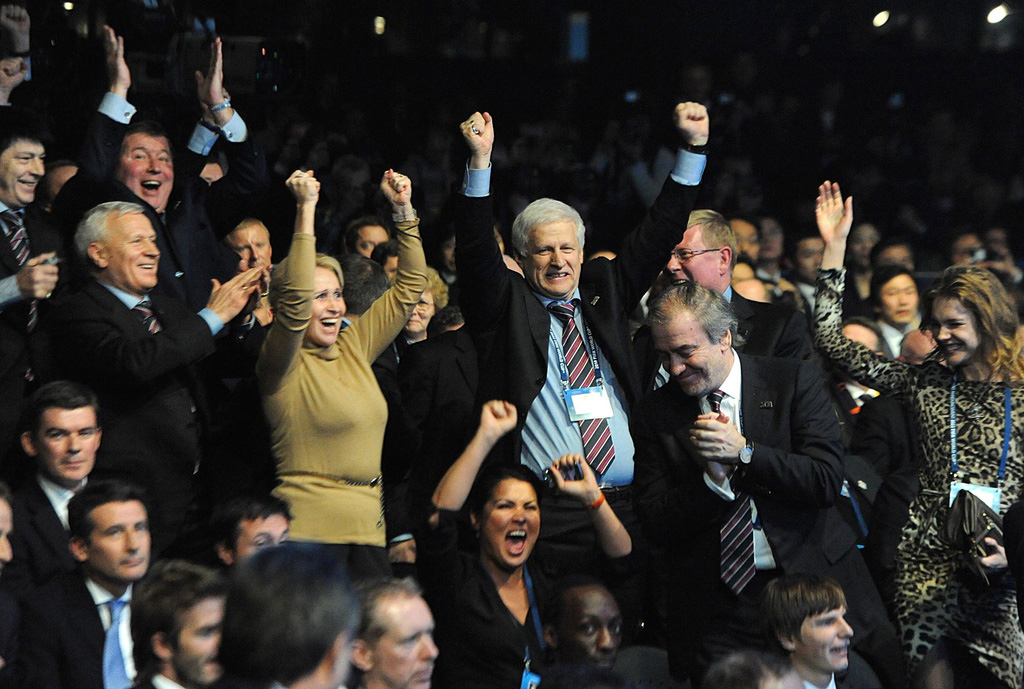Russia and Qatar win race to host World Cups

Russia and Qatar will host the 2018 and 2022 football World Cup tournaments following a vote in Zurich that was mired in allegations of corruption.
The winning bids were announced at a glitzy ceremony at the headquarters of world football governing body Fifa on Thursday. The decision followed presentations by sports stars, government leaders and royalty.
With Brazil already installed as hosts of the next World Cup in 2014, nine bidders were vying for the right to stage the next two prestigious tournaments.
The 22 members of Fifa’s executive committee were still undecided after four hours of deliberation, leading to a delay in the announcement.
But they eventually awarded the 2018 World Cup to Russia, that has never hosted the tournament before. Qatar was the surprise choice to hold the 2022 tournament, the first time it will be held in the Middle East.
In his immediate reaction to the vote, the Russian prime minister, Vladimir Putin, who was not present at the ceremony, said his country loved football, and had “everything to conduct the 2018 World Cup on a very worthy level”.
“[The choice] means that people have confidence in Russia and believe in its abilities, even though some of the sports installations are not ready,” he said.
Putin had boycotted the ceremony presentation ceremonies in protest at the “unscrupulous” campaign that had been aimed at Fifa officials in recent weeks – a reference to the corruption allegations that have surfaced in the British media.
But after the announcement he flew to Zurich straight away to thank the Fifa executive committee and to discuss preparations for the tournament.
Sheikh Mohammed bin Hamad Al-Thani, the crown prince of Qatar, and chairman of his country’s bid committee, said the selection would “sweep away prejudices” against the Middle East and the Islamic world in general.
“Thank you for believing in us. Thank you for having such bold vision.”
The emir of Qatar, Sheikh Mohammed bin Khalifa Al-Thani, described the first World Cup on Arab soil as “something special”.
The Qatari victory was interpreted as a victory for the Arab world among the public in the capital Doha, and more than 10,000 people from different countries poured into the streets to celebrate.
Disappointment for some
Voting figures released after the announcement showed that Russia won an absolute majority of votes in only the second round. England, one of its rivals for the 2018 bid, attracted only two votes and was eliminated after the first round.
Although it led throughout, Qatar needed four rounds, eventually obtaining an absolute majority against the United States.
US President Barack Obama, asked about the result by reporters, commented that he thought it was “the wrong decision”.
The British prime minister, David Cameron, who had gone to Zurich to lobby for England – at one time the favourite – said he was “bitterly disappointed”. David Beckham, also present for England, also expressed disappointment, but wished both winners well.
Former Belgian international Marc Wilmots, whose country was also a candidate, was much blunter. “These two choices show Fifa has totally disregarded sports criteria,” he said.
Spain’s secretary of state for sport, Jaime Lissavetzky, said there was a sort of fashion for “powerful emerging countries” and the choice had to be respected.
Scandal prompts questions
The football World Cup is one the biggest global sporting events, attracting millions of television viewers and generating billions in revenues.
Countries that host the event can also expect to see new jobs created to upgrade infrastructure and an economic boost, mainly through tourism.
But while the winning countries celebrated their victories, the allegations of corruption surrounding the voting process remain unanswered.
Last month, two of the 24 members of the voting executive were suspended following accusations of bribery by the British Sunday Times newspaper. Further allegations of corruption were released by the British Panorama television programme days before the vote.
Fifa has dismissed many of the media allegations, but the scandal has prompted Switzerland to review the way it monitors sporting bodies headquartered in the country.
Sports Minister Ueli Maurer is looking at ways of restructuring regulations and laws to stamp out corruption in sport. At present, non-profit sporting bodies based in Switzerland are not answerable to anti-corruption laws that govern commercial firms.
Some 50 international sporting associations are headquartered on Swiss soil. The International Olympic Committee (IOC) was the first to arrive and has been based in Lausanne since 1915.
The 22 Fifa executives cast their votes to determine the host countries for the 2018 and 2022 World Cups by secret ballot on Thursday.
England, Russia and joint bids from Spain/Portugal and the Netherlands/Belgium were competing for the right to host the 2018 tournament.
The US, Australia, Qatar, Japan and South Korea were each bidding to hold the 2022 World Cup.
The bidding process was formally opened in January 2009 with each country submitting their application forms by March the same year.
The final bid dossiers from each country were received by Fifa in May 2010. Nine separate bids were left in the race for both World Cup tournaments after Indonesia and Mexico pulled out.
As Fifa’s rules dictate that geographical zones can only host a World Cup no more than every three years, the European bids were grouped together for 2018and the others were grouped together for 2022.
Germany hosted the 2006 World Cup, South Africa in 2010 while Brazil has already been chosen as the venue of the 2014 edition.

In compliance with the JTI standards
More: SWI swissinfo.ch certified by the Journalism Trust Initiative














You can find an overview of ongoing debates with our journalists here . Please join us!
If you want to start a conversation about a topic raised in this article or want to report factual errors, email us at english@swissinfo.ch.